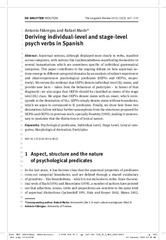Deriving individual-level and stage-level psych verbs in Spanish
Permanent link
https://hdl.handle.net/10037/9051Date
2015-04-28Type
Journal articleTidsskriftartikkel
Peer reviewed
Abstract
Aspectual notions, although displayed most clearly in verbs, manifest across categories, with notions like (un)boundedness manifesting themselves in several instantiations which are sometimes specific of individual grammatical categories. This paper contributes to the ongoing debate on how aspectual notions emerge in different categorial domains by an analysis of subject-experiencer and object-experiencer psychological predicates (SEPVs and OEPVs, respectively). We review the evidence that SEPVs denote individual level (IL) states, and provide new facts – taken from the behaviour of participles – in favour of that diagnostic; we also argue that OEPVs should be classified as states of the stage level (SL) class. We argue that OEPVs denote states with an onset, which corresponds to the denotation of SLs. SEPVs simply denote states without boundaries, which we argue to correspond to IL predicates. Finally, we show how these two denotations follow without further assumptions from the structures proposed for SEPVs and OEPVs in previous work, specially Pesetsky (1995), making it unnecessary to postulate that the distinction is of lexical nature.
Description
Proof. Published version available at http://doi.org/10.1515/tlr-2014-0022.


 English
English norsk
norsk